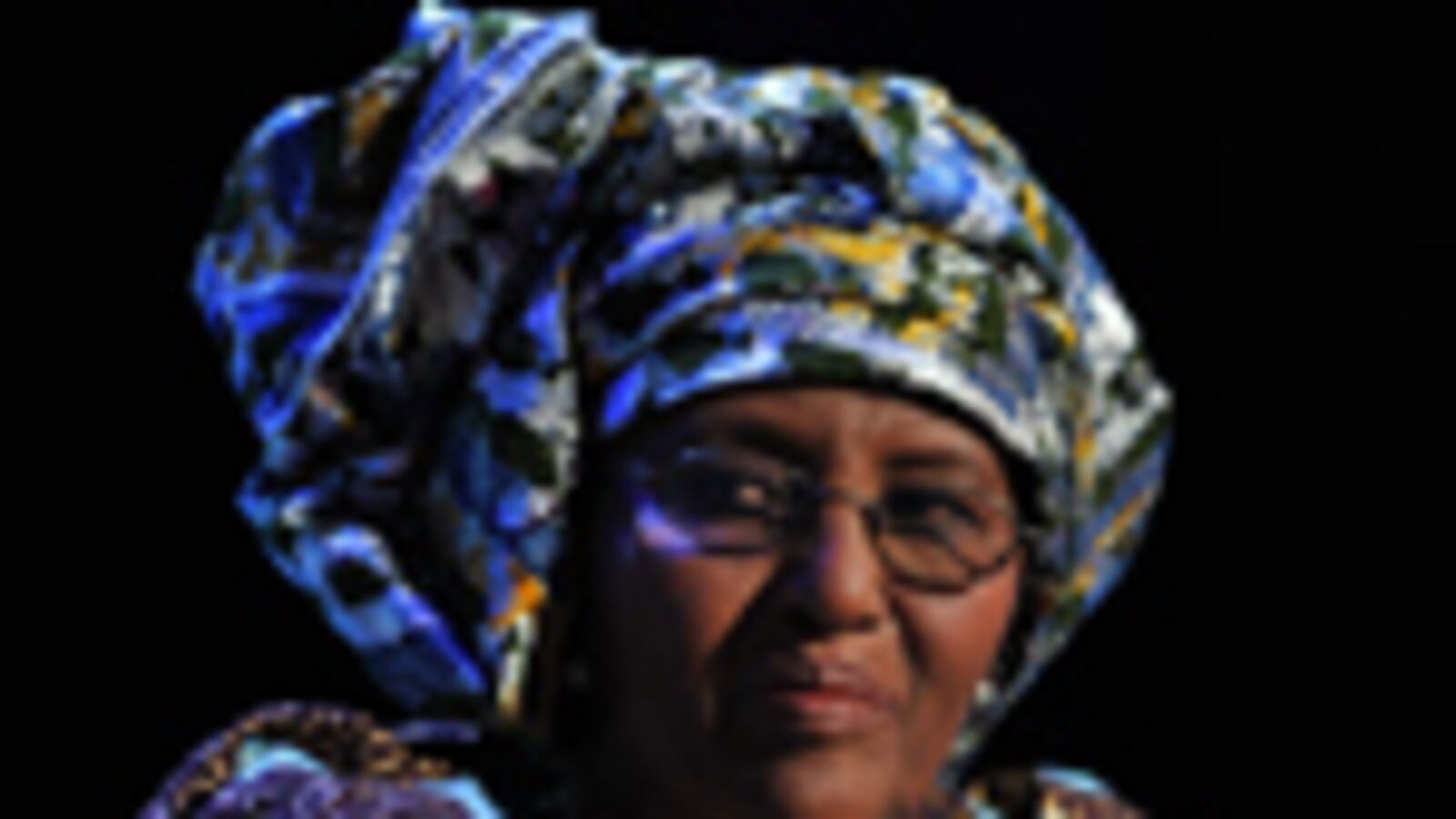From a harrowing tale of sex trafficking in the U.S to a women's utopia in war-torn Somalia, read the incredible stories shared on stage at Newsweek and The Daily Beast's Women in the World Summit this weekend. Plus, photos from every event, video highlights, and complete coverage on our blog.

A Utopia in War-Torn Somalia The heroic Dr. Hawa Abdi explained how she managed to take 1,300 acres in the middle of violence-plagued Somalia and run a peaceful community of 90,000 who receive medical care and food from the 63-year-old gynecologist. “If you don’t follow our rules, you lose your piece of land,” she said. "The boys who grew up in the camp are today the camp guards…We raised a whole generation of police,” added Abdi's daughter. The compound withstood a week of heavy shelling from 750 soldiers from the Party of Islam last year, when many of her staff was rounded up and executed. The militants put Dr. Hawa under house arrest, but she was eventually released. “I will die with my dignity,” she said.

Hillary Clinton Warns Middle East: Don't Shut Women Out In a rousing keynote speech Friday night, Secretary of State Hillary Clinton warned Middle Eastern countries in transition right now not to shut out women from the political process. They "deserve a voice and a vote,” she said. “More than that, they deserve to be able to run for office, to serve as leaders and legislators, even president.” Clinton scolded Egyptian reformers for not including a single woman on the Constitutional Committee, and pointed out that only two women are in the transitional government of Tunisia. “Without involving women in peace, the peace will not be sustained," she warned. Clinton also announced a new partnership between the State Department and Seven Sisters colleges—Barnard, Bryn Mawr, Mount Holyoke, Radcliffe, Vassar, Smith, and Wellesley—to create a new generation of women activists and organizers.

Surviving a Horrific Acid Attack Yem Chhoun told the harrowing story of how her husband's mistress sneaked into her house and attacked her with acid six years ago, leaving her and her newborn disfigured. "It was in the middle of the night around 4 a.m… I was deep asleep but I remember waking up, breastfeeding my baby," she said. "Everything happened so fast, when the acid fell on me I thought it was raining." Her child, Sophorn, was only 12 days old when she was attacked. "I tried my very best to cover and protect the baby but yes the baby was hit as well. I thought that she was gone and I was gone too but look at her now, she's so beautiful," she said. Sophorn, now 6, joined her mother on stage. Dr. Ebby Elahi, an ocular surgeon who cared for the family, said Sophorn was the youngest reported victim of acid violence in the world. He said people in their village thought the baby should be left to die, and that acid attack victims are often stigmatized.

Ashley Judd on her Harrowing Brush with Child Trafficking Actress and activist Ashley Judd shared her own personal brush with child trafficking in the U.S., when a 14-year-old girl she knew well was picked up by a pimp at the Atlanta airport after getting into a fight with her parents. "She pulled a little stunt at the Atlanta airport," Judd said. "Within an hour she was picked up by a pimp. She vanished." When she was rescued by a mall cop, the girl said she had been pimped out 15 times a day, and had contracted STDs at only age 14. "Who are these men who buy children for sex? They are our fathers, they are our brothers, they are our husbands, uncles, cousins and friends. The guy who gets out of the taxi before you get in—the one on the StairMaster next to you in the gym," Judd said. "It is so common." Between 100,000 and 300,000 children in the U.S. are victims of the sex trade.

Why Don't Women Negotiate for Themselves? Why can’t women break through the glass ceiling? Facebook COO Cheryl Sandberg, who was also one of the summit’s co-hosts, says it's because they don't negotiate for themselves so as not to offend co-workers—and studies show they're probably right. "When women negotiate for themselves, both men and women want to work with them less," she said. "They know that people react badly to it." John Donahoe, president and CEO of eBay Inc., added his two cents: “Well, I like it when a women leans in, in any organization.” The crowd laughed. “I am the minority so you can make as much fun of me as you want."

A Cambodian Teen's Remarkable Resilience Sixteen-year-old Sokha Chen performed a haunting and beautiful traditional Cambodian dance to wrap up the Women in the World Summit on Saturday. Chen is a subject of a film that is the centerpiece of 10x10, a global campaign to spotlight the huge potential of girls in developing countries and to educate them. Chicagoan Bill Smith discovered Chen three years ago when she was scavenging for survival in Phnom Penh's toxic garbage dumps. A photographer for the Chicago Bulls, he is the founder of A New Day Cambodia, which rescues children like Sokha. She's now a top student and an accomplished dancer.

Madeleine Albright: Muammar Gaddafi Is a 'Nut' Two former secretaries of state, Madeleine Albright and Condoleezza Rice, engaged in a lively discussion about women's rights in the Middle East, largely dovetailing in their assessments despite the very different administrations they served. Albright called Gaddafi a "nut," while Rice urged caution before the U.S. instates a no-fly zone over Libya. Albright also called the frequency of sexual assault in Egypt "horrifying," while Rice warned that a democratic opening in Egypt means "we're going to hear a lot of voices that we don't want to hear… I think it's going to be quite turbulent and quite difficult."

The Internet 'Unveils' Muslim women Egyptian blogger and activist Dalia Ziada, who joined thousands of other young people demonstrating against Hosni Mubarak on the streets of Egypt, explained in a fascinating discussion that the Internet is empowering young women in the Muslim world. The Internet gives "a space for unveiling the mind of young Muslim women," she said. "I write on my blog. No one cares if I am a man or a woman—if I look bad or if I look good—they only care for my mind." But Ziada acknowledged the disrespect and presumed inequality that still lingers. "When I'm in the streets, they only care for how I look like," she said. Even after standing shoulder-to-shoulder with men in Tahrir Square, women were attacked verbally and physically when they marched to celebrate International Women's Day last week.

Women on the Front Lines: When the Problem Has No Name Congolese activist and radio journalist Chou Chou Namegabe explained in an fascinating panel that when she began covering the brutal sexual violence that has enveloped her country, there was literally no word to describe rape in her language. “There was no word for rape,” she says. She and her colleague came up with a word that meant "the destruction of women," so they could address the issue on the air. “It is a shame to talk about rape. It was taboo to talk about sex on the radio.”

Human-Rights Activist: France's Veil Ban Protects Women Human-rights activists debated France's new law outlawing face-covering veils in public places, with former Dutch parliamentarian Ayaan Hirsi Ali arguing the veil ban will protect girls who are forced into wearing the garb by their families. "Laws should protect them," she said, and added she hopes the ban starts a debate about other religious practices that the state should intervene to stop, such as genital mutilation. Hirsi Ali, who was subjected to genital mutilation as a young girl growing up in Somalia, has been an outspoken opponent of Islam's teachings about women, arguing in her book Infidel that the religion advocates misogyny. "Muslims ask us to respect their religion. I respect their religion... But there are things about that religion I refuse to respect... I refuse to respect the father who marries off his 9-year-old daughter. And when in outrage he's told 'Why are you arranging a rape for a 9-year-old child?" says, 'Well the Prophet Mohammed did.' My response is not only you are wrong, my response would be the Prophet Mohammed is also wrong. And it's up to the Muslim: What offends you more?"

Bill Clinton Jokes 'Not My Fault' There's No Woman President Former President Bill Clinton quipped "not my fault" when Daily Beast founder Tina Brown reminded him there had never been a woman president in an interview on Thursday. "That's one thing that's not my fault," he said, laughing. Clinton wouldn't answer Brown about who he thought the first female president may be, but said, "There will be one and it will be a good thing." Clinton also backed a no-fly zone over Libya, breaking with his wife's position that the U.S. should wait for international consensus. "We should do it," he said.

Zainab Salbi: Let Go of Your Guilt Women's rights activist Zainab Salbi shared the personal story of how she lost touch with a girl who was raised as her sister but did manual labor for her wealthy family. Salbi said she was cruel to Radya, and didn't want to share the affections of her family, which was a part of Saddam Hussein's inner circle. She lost track of Radya when she fled Iraq at age 19 in an arranged marriage, and war after war ravaged Iraq. Radya signed up for Salbi's international mentoring program, Women for Women, without knowing she was the founder, and the two were reunited. Salbi said it was difficult to share that story. "I was embarrassed for a long time... I grew up in a household that hired child labor. I was a selfish child," she said. But she's learned: "All the guilt, it's not worth it… It's in our imperfections that we connect."

The Moment She Decided to Quit Dr. Amy Lehman shared the moment she realized she wanted to ditch her job as a surgeon-in-training at the University of Chicago and build a floating medical center to bring care to the 3 million people living along the shores of Lake Tanganika in Congo, Tanzania, Burundi, and Zambia. After a tough week in the intensive-care unit, "I thought, I'm just going to do a back of the envelope calculation about how much money I spent this week keeping people—elderly, very sick, all on ventilators, really no hope of mental recovery—how much money did I spend? I calculated I spent about $2 million that week," she said. "I thought, what would I have done with that $2 million in the Lake Tanganika Basin? I probably would have saved 10,000 lives."
Liz Goodwin covers national affairs for Yahoo News. She was previously an assistant editor at The Daily Beast.






